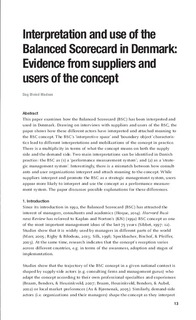Interpretation and use of the Balanced Scorecard in Denmark: Evidence from suppliers and users of the concept
Journal article
Published version
Permanent lenke
http://hdl.handle.net/11250/2631642Utgivelsesdato
2014Metadata
Vis full innførselSamlinger
Originalversjon
Ledelse & Erhvervsøkonomi. 2014, (3/4), 13-28.Sammendrag
This paper examines how the Balanced Scorecard (BSC) has been interpreted and used in Denmark. Drawing on interviews with suppliers and users of the BSC, the paper shows how these diff erent actors have interpreted and attached meaning to the BSC concept. The BSC’s ‘interpretive space’ and ‘boundary object’ characteristics lead to diff erent interpretations and mobilizations of the concept in practice. There is a multiplicity in terms of what the concept means on both the supply side and the demand side. Two main interpretations can be identifi ed in Danish practice: the BSC as (1) a ‘performance measurement system’; and (2) as a ‘strategic management system’. Interestingly, there is a mismatch between how consultants and user organizations interpret and attach meaning to the concept. While suppliers interpret and promote the BSC as a strategic management system, users appear more likely to interpret and use the concept as a performance measurement system. The paper discusses possible explanations for these diff erences.

